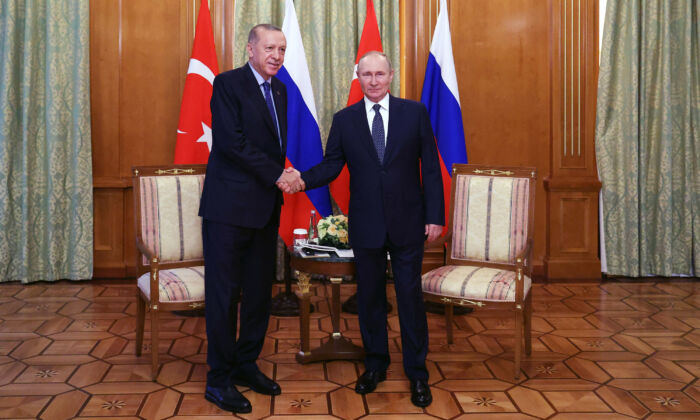Turkey Considers Joining Russia-Led Economic Bloc as Geopolitical Situation Shifts
Turkey confirms its intention to join the BRICS group of nations, raising concerns in the West about its commitment to NATO.
News Analysis
Despite its longstanding membership in the Western NATO alliance, Turkey this week confirmed its intention to join BRICS, a nine-nation economic bloc dominated by heavyweights Russia and China.
While the move is sure to raise hackles in Brussels and Washington, some foreign policy experts believe it is unlikely to affect Turkey’s long-term relations with its Western allies.
Turkish observers say the move constitutes a “natural reaction” to longstanding grievances—one intended to show the collective West that Ankara has “alternatives” to the NATO alliance.
On Sept. 3, Omer Celik, a spokesman for Turkish President Recep Tayyip Erdogan, confirmed Turkey’s intention to join the BRICS group of nations.
“Our president has stated at various times that we want to become a [BRICS] member,” he told reporters in Ankara.
BRICS was established in 2006 by Brazil, Russia, India, and China, with South Africa joining four years later.
Since then, Moscow has sought to further expand the bloc as a means of countering perceived Western economic hegemony and creating a “multipolar” world order.
In the bloc’s first enlargement since 2010, Iran, Egypt, Ethiopia, and the United Arab Emirates all officially joined BRICS in January of this year.
Saudi Arabia is reportedly considering membership, while Malaysia and Azerbaijan have also both formally applied to join the club.
In the event that Turkey joins BRICS as well, it will be the first NATO member to do so.
However, such a move would likely spark Western fears that Ankara, which already enjoys good relations with Moscow, was drifting further into Russia’s orbit.
Asked about such a scenario on Sept. 3, U.S. State Department spokesman Matthew Miller declined to speculate.
“Turkey continues to be an important ally to the United States, with whom we work on a number of issues,” Miller told reporters.
The State Department did not respond to The Epoch Times’ request for additional comment by publication time.

Chinese leader Xi Jinping, Russian President Vladimir Putin, Brazilian President Jair Bolsonaro, Indian Prime Minister Narendra Modi, and South African President Cyril Ramaphosa at a BRICS meeting at the G20 summit in Osaka, Japan, on June 28, 2019. Mikhail Klimentyev /AFP via Getty Images
‘Natural Reaction’
According to Ambassador Matthew Bryza, a former White House and senior State Department official, Turkey’s stated desire to join BRICS does not signal a shift by Ankara away from the West.
“I don’t see this as a new threat to Turkey’s Western relationships,” Bryza told The Epoch Times, adding that the move was likely motivated by two factors.
“Firstly, a strategic tradition [in Turkey] of securing national interests via optionality rather than principled ideology,” Bryza said.
“And, secondly, a desire to spook the West a bit, both out of emotional spite and as a negotiating tactic in pursuit of concessions.”
According to Halil Akinci…



